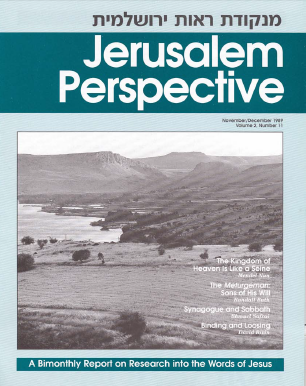How to cite this article: David N. Bivin, “‘Binding’ and ‘Loosing’ in the Kingdom of Heaven,” Jerusalem Perspective 23 (1989): 12-13 [https://www.jerusalemperspective.com/2433/].
Revised: 28-Dec-2012And I will give unto thee the keys of the kingdom of heaven: and whatsoever thou shalt bind on earth shall be bound in heaven: and whatsoever thou shalt loose on earth shall be loosed in heaven. (Matt. 16:19; KJV)
The Hebrew verbs אָסַר (’āsar, “bind”) and הִתִּיר (hitir, “loose”) each appear with more than one meaning in the Hebrew Bible. The verb אָסַר (’āsar) can mean “tie” as in Judges 15:12 and 16:11; “imprison” as in 2 Kings 17:4; “hitch” (a cart, wagon or chariot) as in Genesis 46:29; and “tether” as in Genesis 49:11; while the verb הִתִּיר (hitir) can be the exact opposite of ’āsar in each of its senses.
By the time of Jesus, ’āsar had acquired the additional meaning “forbid,” and its antonym, hitir, had acquired the meaning “permit.” These are the meanings most often found in rabbinic literature.
Jewish sages were called upon constantly by their community to interpret scriptural commands. The Torah forbids working on the Sabbath, for instance, but it does not define what constitutes work. As a result, the sages were required to rule on which activities were permitted on the Sabbath. They “bound,” or prohibited, certain activities, and “loosed” or allowed, others.
Premium Members and Friends of JP must be signed in to view this content.
If you are not a Premium Member or Friend, please consider registering. Prices start at $5/month if paid annually, with other options for monthly and quarterly and more: Sign Up For Premium





Comments 2
Fantastic! So helpful. I especially appreciate how the article shows the principle at work in Peter’s role in resolving the Jew-Gentile questions of the early church. It makes so much sense. Thanks!
Muy Bueno el articulo que deja varias perspectivas de enseñanza, el origen de la instrucción hebrea y la manera en que se aplicaba, y Yeshua lo aplicao y aun sus talmidim. Todah